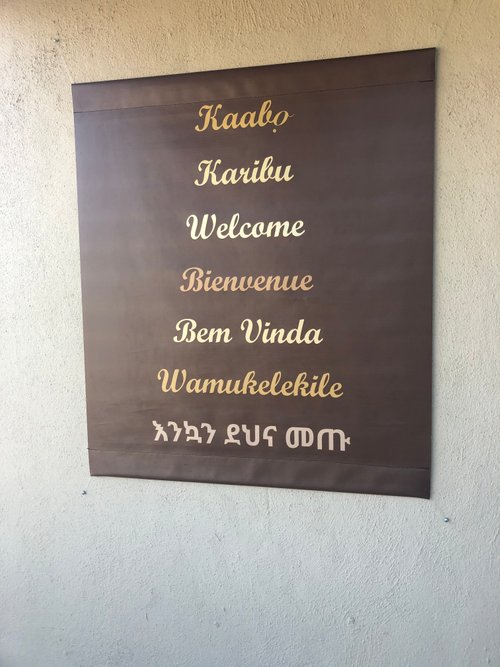The Africa Unbound Museum, Addis Ababa, Ethiopia
5.0 (14 reviews) Monday: Spent 1-2 hours Ranking #15 in Addis Ababa Speciality Museums

Empowering
Specialty Pan-African museum located in Addis Ababa's historic Arada district. Expect a truly one-of-a-kind, memorable experience.



Address
Arada sub-city, Wereda 01, House #533/1-02A, Addis Ababa, Ethiopia.
Mobile
Website
http://africaunbound.com/
Working hours
Monday :
Tuesday : 10:00 AM - 6:00 PM
Wednesday : 10:00 AM - 6:00 PM
Thursday : 10:00 AM - 6:00 PM
Friday : 10:00 AM - 6:00 PM
Saturday : 10:00 AM - 6:00 PM
Sunday :
Current local date and time now
Monday, May 13, 2024, 10:21
User Ratings
5.0 based on (14 reviews)
Excellent
100%
Good
0%
Satisfactory
0%
Poor
0%
Terrible
0%
Reviews
-
5Samson Tesfaye 5:00 PM Jan 13, 2020
Unique
The visit to the Africa Unbound Museum was such a unique experience. I have heard about the Museum but what I saw was not what I was expecting. We booked in advance and we had a guided tour, where we had the opportunity to share our thoughts and experiences. I love how it was curated and how the story flows. How the world is connected and more than ever the importance of how we need to invest in our children. I highly encourage people to visit the museum but don't plan to go there for one hour, as you will be immersed in the discussion and time flies easily. The African Unbound Museum is a great addition to things to do and places to visit in Addis Ababa. Great work!!!!!

-
5Mubangizi 5:00 PM Jan 5, 2020
Awesome and transformative
It is Pliny the Elder who once said: "Out of Africa there is always something new." In the heart of Addis Ababa there is something new and fascinating. This is The African Unbound Museum that has an elaborate vision and mission to radically change how we look at ourselves as Africans and as humans in general. It is an evolutionary path to self awareness using art pieces drown from Africa's millennia of history. I had a guided tour of The African Ubound Museum for about two hours. The articulate tour guide ably explained Africa's long civilization from pre-historic times righto to pan-African movement,then to contemporary luminaries who have left a mark on Africa long march to progress. Some of the thought provoking issues that the museum raises are: what is development? Who is developing? Key African philosophical concepts such as Ubuntu and Ma'at are well illustrated. The museum that is just about three months old comes at a time when the African continent is rethinking its place in an era of globalization with the much celebrated Continental Free Trade Area (CFTA). The African maps used in the Museum have no national boundaries to allude to the fact that Africa is one despite the colonial narrative of balkanization and ethnic divisions. On asking the Founder and Managing Direcor Rahel Kassahum (PhD) on how long to took to set up this fabulous museum, the answer was: "it took almost twenty years of work." From the insights and captions on each art piece, it is evident that indeed a lot of thinking and contemplation went into producing this amazing museum. Not only that, the museum is also a cultural center where seminars are held from time to time. Furthermore, High school students are also mentored in the philosophy that informs the museum. Outreach programs for philanthropic motives are also in place. This is a museum like no other on the continent. I highly recommend this museum to all art lovers and especially those who are thinking deeply about Africa's place in world history. You will find the images of Marcus Gurvey, Kwame Nkrumah, Dubois and many others to set the pace for a quiet reflection amidst the busy urban life. Across the valley, the visitor will also see the newly set up Unity Park and another massive park being set up. The trip will be ended with a freshly brewed Ethiopian coffee at the premises. Review by Odomaro Mubangizi, (PhD)
See also
More Things to do in Addis Ababa
- Churches & Cathedrals in Addis Ababa
- Historic Sites in Addis Ababa
- Art Museums in Addis Ababa
- Speciality Museums in Addis Ababa
- History Museums in Addis Ababa
- Religious Sites in Addis Ababa
- Gardens in Addis Ababa
- Mountains in Addis Ababa
- Nature & Wildlife Areas in Addis Ababa
- Monuments & Statues in Addis Ababa
- Flea & Street Markets in Addis Ababa
- Breweries in Addis Ababa
- Art Galleries in Addis Ababa
- Farmers Markets in Addis Ababa